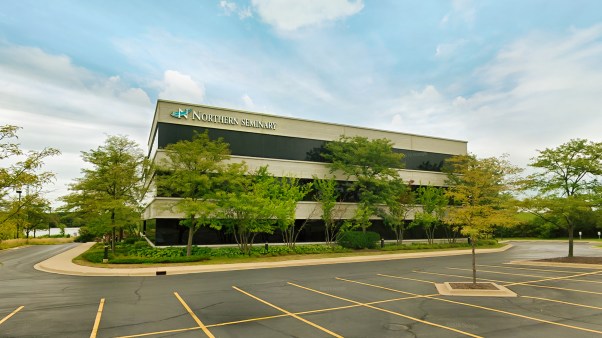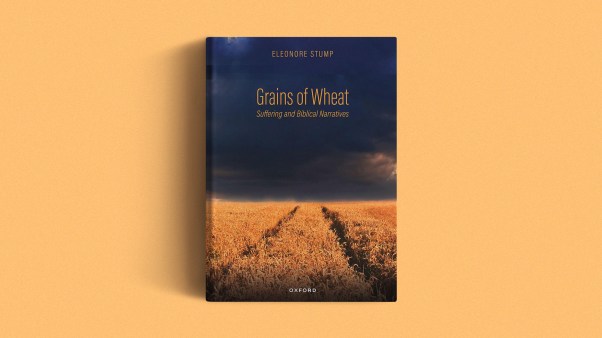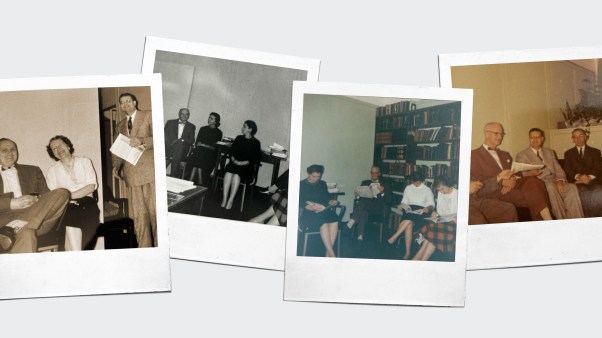A splendid reference book is the easy choice to head the church-history list for this year. The Westminster Dictionary of Church History (Westminster), edited by Jerald C. Brauer, is now indisputably the standard one-volume work for the American reader. Unlike the older Oxford Dictionary of the Christian Church (1957), it gives adequate attention to events since 1700 and in the New World, yet without slighting the earlier centuries. As with any such reference work there are some errors of fact and numerous occasions for disagreement over what information was included and excluded within an entry. On the whole, however, this work will ably serve its intended purpose. Since the price is unavoidably steep, most pastors and seminaries would be delighted to have some thoughtful friend or group give them this tome. (Theological libraries should also have another historical dictionary published not quite two years ago, the Corpus Dictionary of Western Churches [World], edited by T. C. O’Brien. The projected companion on Eastern churches is not yet available.)
Two other noteworthy reference books appeared this past year. The Concise Dictionary of the Christian World Mission (Abingdon) has brief entries on the countries of the world, leaders in the expansion of the church (both missionaries and nationals), and a potpourri of subjects (e.g., home base, indigenous churches, martyrdom, secularism). A Global View of Christian Missions (Baker), unlike the books mentioned so far, is the work of one man, J. Herbert Kane of Trinity seminary. Most of the book is a country-by-country survey of Protestant missions, and due allowance must be made for the limitations on what one man can find out about so many different faraway places. These works supplement the four-year-old Encyclopedia of Modern Christian Missions: The Agencies (Nelson), edited by Burton Goddard on behalf of the Gordon Seminary faculty. Like Kane’s, this work is almost solely Protestant in its coverage. For the religious setting into which Christian missions plunge, the two-year-old Dictionary of Comparative Religion (Scribner), edited by S. G. F. Brandon, is valuable. (DCR has some 500 entries on aspects of Christianity that make for interesting comparison with their counterparts in the strictly Christian dictionaries.)
The history of theology has had an especially good year for new titles. Yale professor Jaroslav Pelikan has issued the first part of his five-volume summa, The Christian Tradition: A History of the Development of Doctrine, under the title The Emergence of the Catholic Tradition (100–600) (University of Chicago). Three noteworthy features: (1) It is extremely well written, explaining comprehendably, even for beginners, doctrinal developments and digressions that are often as crucial as they are abstruse. (2) It is based on long and careful reading of the original Syriac, Greek, and Latin sources, which are integrated into the text (rather than being boringly and lengthily quoted) so that the reader’s attention is directed not to modern scholarly opinion but to the living sources on which Pelikan is basing his narrative. (3) Sermonic, devotional, and liturgical texts are fully used along with representative statements of belief. The bane of histories of modern Christian thought is that in them these sources for what the Christian people as a whole believe are crowded out by what a relatively few university professors have written about their own often quite unrepresentative beliefs. As Pelikan aptly expresses it: “We are trying here to listen to the chorus more than to the soloists.…”
This past year, Pelikan also presented a book that functions as a prolegomenon to The Christian Tradition entitled Historical Theology: Continuity and Change in Christian Doctrine (Corpus and Westminster). In it, he mostly “seeks to spell out the theological and methodological assumptions that have guided me.…” These assumptions, by the way, are not unchallenged in our time, when the personal beliefs of even good historians are seen as having a much greater formative influence on their scholarship than Pelikan seems willing to admit.
Two more modest histories of theology are worthy of mention. A Rhodesian, T. A. Burkill, briefly surveys all the centuries in The Evolution of Christian Thought (Cornell). A somewhat longer treatment by a Cuban resident in America is A History of Christian Thought (Abingdon) by Justo González, of which the second of three volumes is now out. To use Pelikan’s analogy, both works pay more attention to the soloists than to the chorus.
An excellent survey of one facet of Christian thought is A History of Apologetics (Corpus and Westminster) by Avery Dulles. That this book tries to be comprehensive is evidenced by the due recognition given to C. S. Lewis. It is a serious defect that inadequate attention is given to the numerous Christians with beliefs similar to Lewis’s in three new books surveying (chiefly) Protestant theology; Thomas A. Idinopulos, The Erosion of Faith (Quadrangle), James C. Livingston, Modern Christian Thought (Macmillan), and William A. Scott, Historical Protestantism (Prentice-Hall).
Many books appearing this past year will enhance the reader’s understanding of the Protestant Reformation and its aftermath; we can mention only a few. Stephen Ozment has collected nine essays that enable us to see The Reformation in Medieval Perspective (Quadrangle). Some historians forget to do that and consequently distort their accounts. Two surveys of the Reformation stress the political, social, and cultural contexts more than the religious and theological aspects: Lewis W. Spitz, The Renaissance and Reformation Movements (Rand McNally), and Hans J. Hillerbrand, Christendom Divided (Corpus and Westminster). Another survey, Reformation by John M. Todd (Doubleday), stresses the roots and outcome of the religious reformation.
In addition to the usual studies on the major Reformation figures (e.g., The Trial of Luther [Stein and Day] by James Atkinson, The Constructive Revolutionary: John Calvin and His Socio-Economic Impact [John Knox] by W. Fred Graham, and The Church and the Secular Order in Reformation Thought [Columbia University] by John Tonkin), there were: a very welcome and needed introduction to twenty less well known men in Reformers in the Wings (Fortress) by David C. Steinmetz, a long-needed, definitive biography of Arminius (Abingdon) by Carl Bangs, and a volume of essays re-establishing the essential orthodoxy of John Milton, Bright Essence (University of Utah), by W. B. Hunter, C. A. Patrides, and J. H. Adamson.
Kudos to Concordia for presenting in English translation two of the major tomes of Martin Chemnitz (1522–86), one of the most important early Lutheran theologians: The Two Natures in Christ and Examination of the Council of Trent: Part I. (The other three parts may eventually appear.) The latter work attempts to refute the Catholic position on the Scriptures, original sin, good works, free will, and justification. The reader does not have to agree with all of Chemnitz’s exegetical conclusions to enhance his own theological understanding. Contemporary Protestantism needs a modern Chemnitz to interact with Vatican II as well as the varieties of academic Protestant theology.
Meanwhile the American edition of Luther’s works nears completion with the publication of several writings expressing his views on the real presence of Christ in the sacrament under the title Word and Sacrament IV (Fortress). John Dillenberger has compiled a splendid and inexpensive selection of writings of John Calvin (Doubleday), and Leonard J. Trenterud has very ably collected some sixteen documents that mirror many of the trends within Elizabethan Puritanism (Oxford). Many of the Puritan and other Reformed classics are being brought back into print or issued at much lower prices by Sovereign Grace—for example, John Gill’s Body of Divinity and Calvin’s Commentaries.
In recent years there has been considerable interest in the study of what is called, among other things, America’s civil religion. Many other nations have traditionally been identified with some particular denomination of Christianity, Islam, or Buddhism. India has Hinduism, and China and Japan have had civil religions alongside of Buddhism. America, by contrast, was not only denominationally pluralistic from the beginning but also had nominally Christian (at best) deists prominently numbered among its Founding Fathers. Hence unintentionally but understandably a religion evolved that is related to, but must be clearly distinguished from, Protestantism. Three recent books approach America’s civil religion differently. Robert Handy offers a monograph re-examining the historical sources to glean the intentions of our predecessors, A Christian America: Protestant Hopes and Historical Realities (Oxford). Some of these writings from the past are collected by Conrad Cherry under the title God’s New Israel: Religious Interpretations of American Destiny (Prentice-Hall). Jonathan Edwards, Abraham Lincoln, and John Foster Dulles are among the thirty men represented in the anthology. Elwyn Smyth had ten other professors join him in writing articles reflecting the divergent contemporary understandings and appraisals of The Religion of the Republic (Fortress). Anyone who reads these three new books along with Martin Marty’s 1970 title, Righteous Empire: The Protestant Experience in America (Dial), will be in a good position to join in the discussion of America’s civil religion.
Another topic in which there has been considerable interest of late is treated in The Black Church in America (Basic Books). Thirty-three previously published articles have been conveniently assembled in this volume. One hopes it is a harbinger of more study in this long neglected portion of American religion. Two brief books survey the long histories of recurring endeavors of the churches: Robert Lynn and Elliott Wright, The Big Little School: Two Hundred Years of the Sunday School (Harper & Row), and Paul Conley and Andrew Sorensen, The Staggering Steeple: The Story of Alcoholism and the Churches (Pilgrim Press).
Probably the best of several good studies on colonial America is Robert Middlekauff’s The Mathers: Three Generations of Puritan Intellectuals, 1596–1728 (Oxford). Richard, Increase, and Cotton emerge with more positive reputations as Christian leaders and with considerable variation from conventional interpretations. Many Puritan descendants are studied in the prize-winning monograph of Daniel Walker Howe, The Unitarian Conscience: Harvard Moral Philosophy, 1805–1861 (Harvard). Two books are especially noteworthy on more recent times, both dealing with groups outside the historiographical mainstream: Vinson Synan, The Holiness-Pentecostal Movement in the United States (Eerdmans), and David Harrell, Jr., White Sects and Black Men in the Recent South (Vanderbilt). Harrell presents evidence to shatter some stereotypes. Synan’s scope is both broader, in that non-tongues groups are included, and narrower, in that it is more confined to this country, than the five-year-old Pentecostalism by John Thomas Nichol (recently made available in paperback by Logos).
Major American publications on Christianity elsewhere were not so numerous in 1971. Russian religion of the eighteenth century is ably depicted by James Cracraft in The Church Reform of Peter the Great (Stanford), and the same is done for the twentieth century in twenty-seven essays edited by Richard Marshall, Jr., Aspects of Religion in the Soviet Union: 1917–1967 (University of Chicago). The interaction of Muslims and Christians is investigated by Joseph Grabill in Protestant Diplomacy and the Near East: Missionary Influence on American Policy, 1810–1927 (University of Minnesota), and by Noel King in Christian and Muslim Africa (Harper & Row). Grabill’s work can serve as a model for investigation of the wider impact of missionaries, and King gives a splendid guide for further study on this most important topic for those concerned with world evangelization. On the Far East, one monograph, Jessie Gregory Lutz, China and the Christian Colleges, 1850–1950 (Cornell), and two surveys, Richard H. Drummond, A History of Christianity in Japan (Eerdmans) and Arthur Tuggy, The Philippine Church: Growth in a Changing Society (Eerdmans), deserve special mention. An overall view of global issues, trends, and influential forces is provided by John Hardon’s Christianity in the Twentieth Century (Doubleday).
There are many other recent books of interest to more than specialists. Among those on the distant past:
From Christ to Constantine (Inter-Varsity) by M. A. Smith. Well-written and illustrated. A good and inexpensive introductory survey.
Constantine the Great (Scribner) by John Holland Smith.
Judaism and the Early Christian Mind: A Study of Cyril of Alexandria’s Exegesis and Theology (Yale) by Robert Wilken.
The Albigensian Crusades (Dial) by Joseph Strayer.
Women of the Reformation in Germany and Italy (Augsburg) by Roland Bainton.
On the more recent past outside America:
The Birth of Methodism in England (University of Chicago) by Elie Halévy. Translation of two 1906 articles.
People Movements in Southern Polynesia (Moody) by Alan Tippett.
Roman Catholic Modernism (Stanford) edited by Bernard Reardon. An anthology of the turn-of-the-century movement.
The Discipling of West Cameroon: A Study of Baptist Growth (Eerdmans) by Lloyd Kwast.
Icon and Swastika: The Russian Orthodox Church Under Nazi and Soviet Control (Harvard) by Harvey Fireside.
Faith on Trial in Russia (Harper & Row) by Michael Bourdeaux. On the division among evangelicals.
On early American religious history:
The Pilgrim Way (Pilgrim Press) by Robert M. Bartlett. Especially on Pastor John Robinson, many of whose flock founded Plymouth Colony.
New England Dissent, 1630–1833: The Baptists and the Separation of Church and State (Harvard) by William McLoughlin. An exhaustive and timely two-volume study.
Parsons and Pedagogues: The S.P.G. Adventure in American Education (Columbia) by John Calam. On the work of Anglican missionaries to the colonies.
Samuel Davies: Apostle of Dissent in Colonial Virginia (University of Tennessee) by George Pilcher.
The Journal and Major Essays of John Woolman (Oxford) edited by Phillips Moulton.
The Life and Writings of Francis Makemie (Presbyterian Historical Society) by Boyd Schlenther.
The Great Awakening and the American Revolution (Rand McNally) by Cedric Cowing.
On nineteenth- and twentieth-century America:
Church Leader in the Cities: William Augustus Muhlenberg (University of Pennsylvania) by Alvin Skardon.
The American Shakers: From Neo-Christianity to Presocialism (University of Massachusetts) by Henri Desroche.
Channing: The Reluctant Radical (Little, Brown) by Jack Mendelsohn.
No Man Knows My History: The Life of Joseph Smith (Knopf) by Fawn Brodie. Revised edition of a highly praised interpretative study of the Mormon prophet.
Church History in the Age of Science: Historiographical Patterns in the United States, 1876–1918 (University of North Carolina) by Henry Bowden.
The Spiritual Crisis of the Gilded Age (Northern Illinois University) by Paul Carter.
Movement of Destiny (Review and Herald) by LeRoy Froom. Though hardly the history of Seventh-day Adventism that it purports to be, it is a useful collection of selected sources.
Anointed to Serve: The Story of the Assemblies of God (Gospel Publishing House) by William Menzies.
Worldly Goods: The Wealth and Power of the American Catholic Church (Random House) by James Gollin.
The School Prayer Decisions: From Court Policy to Local Practice (University of Chicago) by Kenneth Dolbeare and Phillip Hammond. Based on a study of five Midwestern communities.
Finally, four meritorious books that help to put the history of Christianity in the wider context of secular history and the history of religions:
A World History (Oxford) by William McNeill. Second edition of what is probably the best work of its kind.
The Harvest of Hellenism: A History of the Near East From Alexander the Great to the Triumph of Christianity (Simon and Schuster) by F. E. Peters.
Religion and Man: An Introduction (Harper & Row) edited by Richard Comstock.
Historiography: Secular and Religious (Craig) by Gordon Clark. The well-known philosopher offers a major study of a topic on which evangelicals have written little.










